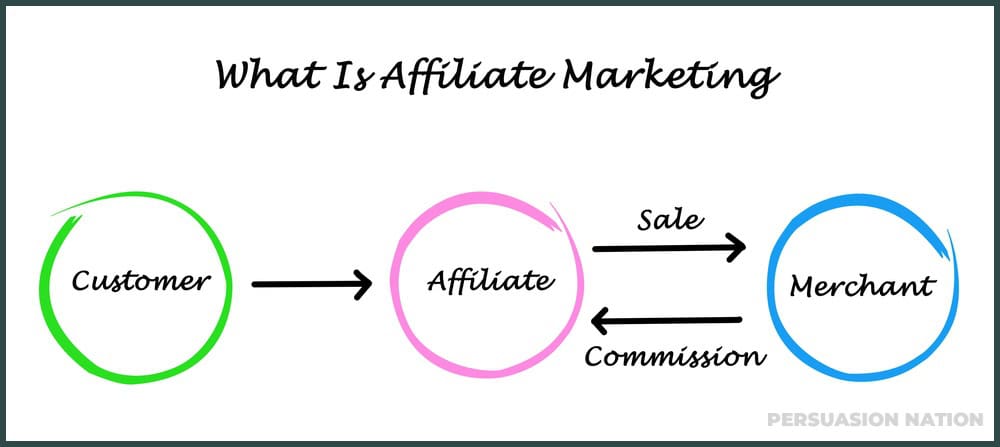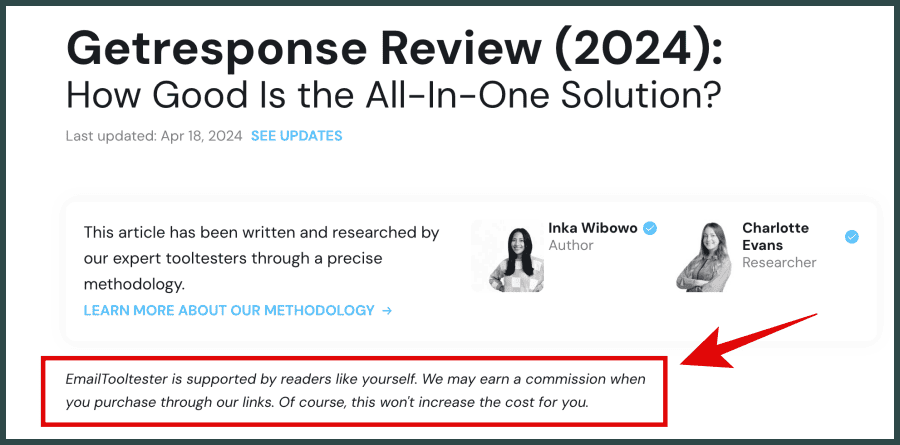21 Things to Know Before Starting Affiliate Marketing: A Beginner’s Guide

Affiliate marketing is escalating rapidly, with spending projected to reach $27.78 billion by 2027. As an evolving industry, understanding how affiliate marketing works is the key to making good money in this space.
I’ve been an affiliate marketer for over half a decade, generating over $600k in profits. I know what it takes to succeed.
There are CORE THINGS to know first before you start. That’s what this guide is all about!
21 Things to Know Before Starting Affiliate Marketing
Below are the list of things to be aware of before getting into affiliate marketing:
- Understand what affiliate marketing is: It involves earning a commission by promoting other people’s (or company’s) products.
- Choose your niche wisely: Picking a niche you’re interested in ensures long-term engagement and expertise.
- Know your audience: Tailor your content to your audience’s needs to optimize engagement.
- Learn traffic acquisition: Your ability to attract visitors is crucial for success.
- Promote multiple products judiciously: You can work with various brands but maintain relevance and focus.
- Develop content creation skills: Producing compelling content is key to engaging your audience.
- Platform differences matter: Different social networks and marketing platforms have unique features and audiences.
- Patience pays off: Success takes time, so be prepared for a long-term effort.
- Easy to start, hard to master: Becoming an affiliate is simple, but effective marketing takes skill.
- Value over pitches: Aim to help your audience rather than just selling to them.
- Diversify traffic sources: Limiting yourself to one traffic source is risky.
- Track and measure everything: Analytics are crucial for understanding what works and what doesn’t.
- Be a product connoisseur: Use the products you promote to ensure authenticity.
- Ethical marketing is a must: Transparency builds trust with your audience.
- Networking is invaluable: Connections can provide insights and opportunities.
- Avoid link spamming: It can lead to bans and damage your reputation.
- Invest in your knowledge: Be ready to spend on learning and resources.
- Aim to build a brand: A strong, recognizable brand can amplify your success.
- Follow top affiliates: They can provide strategies and inspiration.
- Embrace failures: Use them as lessons to grow and improve.
- Provide diversified content: Don’t rely on a single type of content or platform.
Let me explain these tips and show you how to go about them.
1. Have A Clear Understanding Of Affiliate Marketing
Before diving into affiliate marketing, you must grasp its core concept. Affiliate marketing is a performance-based marketing strategy where you, as an affiliate, earn a commission for marketing another company’s products or services.
Here’s how an affiliate works in a nutshell:
When Merchant creates a product or service, it creates a tracking link for promoters (you as an affiliate). Then, you get your tracking link and send traffic to it by advertising it to potential customers or consumers. When they make a purchase, you earn a commission percentage off the sale.
Like this:

To succeed, it’s essential to familiarize yourself with the process:
- You choose a product you want to promote.
- Sign up for the merchant’s affiliate program to receive an affiliate link.
- You share this link via your website, blog, social media, or other platforms.
- A potential customer clicks on your link and makes a purchase.
- You earn a commission from the sale, as tracked via your affiliate link.
The commission type is largely dependent on what the merchant wants. It could be Pay-per-sale (PPS), Pay-per-click (PPC), or Pay-per-lead (PPL).
2. Pick The Perfect Niche
Selecting the appropriate niche is a foundational step in affiliate marketing.
Your niche determines your focus area and the products you’ll promote. It’s a balancing act between your interests and what’s profitable.
To thrive, consider these factors:
- Interest and Passion
- Profit Potential
- Knowledge and Expertise

First, I’d start by finding something you’re excited about, like a hobby or interest, and focus on that. It’s much easier to keep going when you genuinely love what you’re doing, especially when just starting.
You also want to find that sweet spot where enough people are interested in your offering but not so many competitors that you get lost in the crowd. Think of it like picking the perfect dish at a buffet—you want it to be popular enough that it’s tasty but not so common that everyone’s already eaten it.
And remember, the more you learn about your niche, the better you’ll be at it. It’s like getting a head start in a race – the more you know, the further ahead you’ll be compared to everyone else.
Choose wisely; your niche sets the stage for your affiliate marketing journey, blending your passion with profitability for long-term success.
3. Understand Who Your Audiences Are
Understanding your audience is the bedrock upon which successful affiliate marketing is built.
Knowing their needs, preferences, and problems allows you to effectively tailor your content and product recommendations.
Here are a few key things to know:
Demographic Details: Consider basic demographic information such as age, gender, location, and education level. These can influence purchasing decisions and help you to select appropriate products to promote.
Interests and Hobbies: What are their passions and interests? Promoting products that align with what excites your audience will likely resonate better.
Pain Points: Identify issues your audience faces. Your role is to provide solutions through the products you endorse.
Engagement Patterns: Observe how your audience interacts with online content. What type of posts do they engage with most? This can guide the format of your affiliate content.
Value Proposition: Clearly define why your audience should purchase through your affiliate links. What additional value can you provide?
For example, if you’re starting an affiliate marketing niche focused on outdoor gear, your audience might be outdoor enthusiasts. Consider the types of gear they might need for different seasons, their concerns about product environmental sustainability, or their level of expertise in outdoor activities.
Catering to these specifics ensures relevance and builds trust.
4. You Need A Traffic Acquisition Skill (arguably the most important)
As an affiliate, mastering traffic acquisition is pivotal to your success.
This is the most critical thing you shouldn’t neglect on this list.
Think of your affiliate business as a boutique in a bustling city. Even the most appealing window display goes unnoticed without a steady flow of pedestrians. Your digital ’boutique’ needs online traffic—visitors who may become customers—drawn to your content promoting affiliate products.
Here’s a list of different traffic acquisition skills I’ve mastered over the years:
- Search Engine Optimization (SEO): Optimizing your content to rank higher in search engine results and gain organic traffic.
- Pay-Per-Click (PPC) Advertising: Using paid ads to drive traffic, where you pay for each click on your ad.
- Email Marketing: Sending newsletters, promotional offers, and engaging content to a list of subscribers.
- Social Media Marketing: Promoting content and engaging with users on social media platforms to drive traffic.
When getting started, I’d recommend focusing on one traffic skill, which helps you channel your energy and resources efficiently.
For instance, if you’re adept at writing and researching, blogging paired with solid SEO practices can be your stronghold. This approach has been my specialty for the past 7 years.
Producing helpful, SEO-optimized blog content establishes a footing in search engines, which funnels potential customers to your affiliate links.
5. You Can Be An Affiliate For Multiple Companies (but with wisdom)
One of the things I particularly love about the affiliate business model is that there are no restrictions to the number of affiliate programs you can join. Joining multiple programs means you will be earning from multiple sources. Hence, an opportunity to make more money.
Affiliate marketing offers the flexibility to partner with various companies, enabling you to diversify your revenue streams.
However, when selectively participating in multiple programs, ideally, they should resonate with your niche and audience. This ensures alignment and authenticity in your promotions, safeguarding your reputation and brand integrity.
Let’s say you’re in the pet affiliate niche. You wouldn’t randomly sign up for beauty affiliate programs. Your target offers should revolve around dog foods, cat foods, pet insurance, dog collars, etc.
Each piece of your content should fit well within the pet niche and reflect your style. The same principle applies to selecting affiliate programs—they should be a natural part of your setup.
6. You Need Content Creation/Copywriting Skills
I bet you wouldn’t be reading this article if I never learned and mastered how to write content. Would you?
My success as an affiliate marketer over the years can be attributed to how well and enough I could write and the emotions and feelings those written did to people to make them buy from my affiliate links.
When you embark on this journey, your ability to create compelling content is crucial. Copywriting is the art of crafting text with the intention of persuading or encouraging your audience to take a certain action, like clicking a link or making a purchase.
It is how you craft those words or texts that make people buy.
Imagine you’re trying to sell a state-of-the-art blender. Rather than saying, “Buy this blender,” a skilled affiliate would demonstrate how this blender will help create nutritious smoothies in under a minute, making a healthy lifestyle effortless and accessible.
7. You Must Understand How Different Platforms Work
When venturing into affiliate marketing, you must grasp the nuances of the platforms you utilize.
Each has its own rules, audience behaviors, and optimization strategies.
Ads and PPC:
- Google Ads – You can use Pay-Per-Click (PPC) campaigns where you pay for each click to your affiliate products. Keywords need careful research, and bids must be managed effectively.
- Facebook Ads – These are more visual and can target specific demographics, interests, and behaviors.
SEO:
Organic reach through Search Engine Optimization (SEO) can bring long-term benefits. Tailor your content to cater to specific keywords and ensure your website is optimized for search engines.
YouTube:
YouTube is a visual platform that demands engaging video content, including product reviews, tutorials, or showcases. Remember to use clear descriptions with affiliate links.
Social Media:
Different social media platforms cater to varied content styles. For example, Instagram favors eye-catching images and Stories, while Twitter is for brief, timely updates.
8. Patience And Persistence Is Key
Affiliate marketing is not a get-rich-quick scheme. It sounds cliche, but that’s for a fact!
Your success in this field hinges on patience and persistence. Like planting a seed, it takes time to cultivate a profitable affiliate marketing business. Initially, you may not see immediate returns on your efforts as you build up your presence and learn the ropes.
When starting as an affiliate marketer, set realistic expectations:
- Time Investment: It will likely take several months to a year before you begin to see a substantial income.
- Learning Curve: Prepare to spend time learning the best practices and staying informed about industry changes.
- Consistency: Regularly creating and optimizing content is essential to rank higher in search engines and attract an audience.
9. It Is Easy To Become An Affiliate Marketer (but marketing could be hard)
Think of it like this: imagine you’re selling lemonade. Sure, setting up your stand and pouring some lemonade into cups is easy. That’s like becoming an affiliate marketer—simple enough.
But getting people actually to buy your lemonade?
That’s where the real work comes in. You must figure out where to set up your stand, how to attract customers, and why they should choose your lemonade over the competition. That’s the marketing part, and yeah, it can be tough for a total newbie.
This is where the previous tips come in handy:
- Pick a niche you understand
- Learn how to drive traffic
- Learn how to create on the internet (content creation/copywriting)
- Understanding how the different platforms work
Taking time to learn and practice these four key points would put you ahead of many when it comes to marketing.
This involves understanding your potential customers, creating engaging content that resonates with them, and knowing how to reach them through various online channels.
For instance, if you’re promoting fitness products, you’ll need to identify where fitness enthusiasts gather online and craft compelling messages that convince them to click on your affiliate links.
10. Focus On Providing Value Over Everything Else
In affiliate marketing, the essence of your success rests on the value you bring to your audience. Instead of solely concentrating on sales and commissions, focus on enriching your followers’ lives.
People buy when ONE thing is met: After they’ve gotten value.
Value can emanate from educating, solving problems, or enriching the user experience.
- Educate Your Audience: Provide insightful and thorough content around your niche products, building credibility.
- Identify Problems: Look for common challenges within your niche and offer solutions through the products you affiliate with.
When you put value first, you naturally cultivate a trusting relationship with your audience. They’re more likely to rely on your recommendations, translating to fat affiliate commissions.
11. Diversify Your Traffic Sources (don’t rely on one)
Your success in marketing hinges on your ability to attract and retain an audience. Diversifying your traffic sources is not just important; it’s imperative for long-term stability.
When you rely on a single channel for your audience, you expose your affiliate business to risk.
Imagine your sole traffic source as a bridge; if that bridge faltered, your entire traffic flow would halt. You must build multiple bridges to ensure a continuous stream of visitors.
Here are a few traffic sources I’d suggest:
- Organic Search: Optimize your content with SEO best practices to rank in search engine results.
- Paid Advertising: Invest in paid ads, such as PPC campaigns, to target potential customers actively.
- Social Media: Leverage platforms like Facebook, Twitter, and Instagram to engage with your audience.
- Email Marketing: Build an email list to communicate directly with your subscribers.
- Content Marketing: Create valuable content such as blogs, videos, and infographics to attract visitors.
- Referral Traffic: Network with peers and encourage them to refer traffic back to your sites.
- Guest Posting: Write articles for other reputable websites to reach broader audiences.
12. Please Diversify Your Earning Sources

It’s important not to put all your eggs in one basket. Diversifying your earning sources can help mitigate risks associated with market changes, advertiser alterations, and product cycle evolutions.
Apart from the need to apply to have multiple affiliate programs pay you, it’s wise to spread your efforts beyond promoting other people’s products.
This strategy helps mitigate the risk of relying too heavily on a single source of income, which could be vulnerable to changes in market trends, product availability, or commission structures.
Here are other avenues to explore:
- Digital products
- Display ads
- Consulting or coaching services
- Sponsored content/ads
- Marketing services
By diversifying, you can tap into different audiences’ wants, expanding your earning potential.
For example, suppose one affiliate program experiences a downturn. In that case, you can still generate income from your digital products or consulting services in the niche – in addition to generating income from other programs.
13. Always Measure & Track Your Results
Measuring and tracking your results is the compass that guides your affiliate marketing ship.
Without it, you’re navigating blind. Think of your marketing campaign as a garden. Just as a gardener measures growth and monitors the health of plants, you should track various metrics to understand the performance of your campaigns.
Two essential metrics I love tracking are:
- Click-Through Rate (CTR): This reflects the percentage of visitors who click on your affiliate link out of the total number who view it.
- Conversion Rate: The fraction of visitors who click and make a purchase.
Lets say my CTR is low despite high traffic; it’s like having many people walk past your store but not many stopping to look inside. I’d investigate what might be the problem. In this case, I would:
- Adjust and optimize my Title tags
- Improve meta descriptions
- Optimize for featured snippets
14. I’d Recommend Always To Try Or Buy The Products You Promote
Your credibility is paramount in this business.
This is why I strongly advise that you try or purchase the products you recommend to your audience. Establishing trust is easier when your promotions are based on authentic experiences rather than just advertisements.
Why Trying Products Matters:
- Authenticity: Your firsthand account adds personal insight, making your advocacy more genuine.
- Trust: Followers are more inclined to trust your recommendations if they stem from personal use.
- Understanding: You gain a deeper understanding of the product, which enhances your ability to highlight its benefits and address potential questions or concerns.
Let’s say you have a fitness site promoting fitness equipment; it’s ideal to use it yourself (or have someone use it) and share your workout results and personal experience with the product’s durability and functionality.
15. Be Transparent And Adhere To Ethical Standards
Your reputation is paramount in affiliate marketing. Ethical standards and legal compliance are not just recommendations but essential practices that protect you and your audience.
Transparency fosters trust and is a cornerstone of every business’s success. You must explicitly disclose your affiliate relationships to your readers or audience.
Also, familiarize yourself with the Federal Trade Commission’s (FTC) endorsement guidelines. Explicitly disclose your affiliate relationships to your audience to avoid misleading them.
Make your affiliate disclosures clear and conspicuous.
Like this GetResponse Review by EmailTooltester:

16. Network & Building Relationships
I’ve landed numerous partnerships and learned many new things by building relationships with other marketers.
Networking is vital because it lets you connect with your niche’s experienced affiliates, merchants, and influencers. These connections can provide valuable insights, introduce you to new products, and often facilitate better affiliate terms.
This journey can be lonely sometimes, and you must engage with people with similar interests and goals.
It could be by:
- Connecting with Merchants: Developing a good relationship with merchants can lead to exclusive offers for your audience, better commission rates, and advance notice of upcoming products or promotions.
- Engaging with Other Affiliates: Other affiliates can share strategies that work and those that don’t, effectively guiding your approach and helping you avoid common pitfalls.
- Participating in Communities: Join affiliate marketing forums and groups on social media. These communities are valuable sources of support and information.
17. Never Spam Your Links (easy ban)
Spamming can quickly lead to bans from affiliate programs and tarnish your reputation.
When starting as an affiliate marketer, one crucial rule is never to spam your affiliate links.
Imagine you’re promoting a kitchen gadget. Create a blog post demonstrating its benefits in a recipe rather than posting your link in multiple Facebook groups every hour. Share the post once in a relevant group with a caption that adds to the conversation.
This approach is effective and maintains the integrity of both your brand and the affiliate program without abusing or trying to game the system.
Make sure to familiarize yourself with the rules of each platform you use to ensure compliance and avoid penalties.
18. Invest In Learning & Resources (you need money to make money)
Yes, you need money to make money.
Time is money. So, investing in your education and resources is also an investment.
Also, remember that acquiring knowledge could involve expenses such as purchasing courses, attending webinars, or subscribing to marketing tools that aid in keyword research, market analysis, and campaign management.
If you’re starting, you might opt for an online course priced at $100 to learn the basics of SEO, which is essential in driving organic traffic to your affiliate links.
Coupled with a basic subscription to a keyword research tool for ~$30 per month, you’re looking at a front-up cost of $100 and a recurring $30 monthly fee. While it’s a sum to consider, these investments are building blocks to create more informed, effective campaigns that can increase your potential affiliate income.
While free resources are valuable, paid resources often provide a more structured learning path and advanced insights. Balance your budget with investing in quality learning and marketing tools.
19. Aim To Build A Brand
When stepping into affiliate marketing, you should focus on building your brand.
Here’s why and how it’s crucial for long-term success:
Trust & Authority: As an affiliate, you advocate for other companies’ products, but fostering your brand gives you credibility. Consumers tend to trust brands rather than anonymous entities, making them more likely to take action on your recommendations.
Recognition: A strong brand stands out. With many affiliates promoting similar products, a unique brand can differentiate you, helping you capture and retain attention.
Customer Loyalty: Branding translates into loyalty. Once customers trust your brand, they’re more likely to return, convert, and recommend it to others.
Marketing Leverage: A well-established brand can negotiate better deals, including higher commission rates and exclusive partnerships.
20. Follow The Top Affiliates In The Industry
Staying current in affiliate marketing often involves learning from the best.
Some of my favorite affiliates I follow are – Matt Diggity, Pat Flynn, Spencer Haws, and Charles Floate, who can provide invaluable insights. These individuals are known for their expertise and success in affiliate marketing.
To keep up with these professionals, consider the following actions:
- Subscribe to their newsletters for the latest content directly in your inbox.
- Follow their blogs and social media profiles for real-time updates.
- Listen to their podcasts to gain insights while on the go.
- Pay for premium content by joining their communities or membership sites if they allow them to interact with other affiliates.
Remember, while following these experts is beneficial, ensure you apply what you learn to your strategies and adapt their advice to fit your unique situation.
21. Be Ready To Fail (but take them as lessons & stepping stones)
Failure can serve as a powerful teacher, illuminating what doesn’t work and highlighting areas for improvement.
I’ve discovered that encountering setbacks is inevitable, but viewing these instances as learning opportunities is crucial for growth.
Always set your mind to:
- Expect and Accept: Not every strategy you try will succeed, but that’s part of the journey.
- Reflect: After a setback, take time to analyze what happened. What can be done better next time?
- Adapt: Use your experience to refine your methods. Maybe a certain marketing channel isn’t working, or your audience isn’t responding to specific messaging.
It’s also beneficial to seek lessons from successful affiliate marketers, many of whom have faced their failures and turned them into stepping stones toward success.
To keep you organized and goal-oriented through the ups and downs, consider the following approach:
| Activity | Purpose |
|---|---|
| Documenting Failures | To remember the specifics of what went wrong |
| Identifying Lessons | To glean specific insights from each failure |
| Applying Changes | To immediately integrate these lessons into your strategy |
| Monitoring Outcomes | To see if changes have a positive impact |
By willingly engaging with failure, you transform what many fear into a catalyst for innovation and success in your affiliate marketing endeavors.
FAQs
Can you be an affiliate for multiple companies?
Yes, you can partner with multiple companies as an affiliate. It’s common practice to diversify your affiliate relationships to maximize revenue opportunities. Joining multiple programs means you will be earning from multiple sources.
Is affiliate marketing worth it?
Affiliate marketing can be lucrative when done right. It offers the potential for a steady income stream, but success depends on your marketing skills and the effort you put in.
What are the initial steps a beginner should take in affiliate marketing?
Begin by choosing a niche that interests you, then find affiliate programs or networks relevant. Next, create valuable content and build an online presence where you can promote your chosen products or services.
How much do affiliate marketers make?
Affiliate earnings vary widely; some make a few dollars, while others earn six-figure incomes annually. Your income will depend on the products you promote, your marketing strategies, and your audience size. However, our affiliate marketing statistics show that the average affiliate marketer is earning $8,038 per month.
Can affiliate marketing be self-taught, and where should one start?
Affiliate marketing skills can be self-taught using online resources, YouTube videos, forums, and paid courses. Start by researching basic marketing principles, studying successful affiliates, and understanding the market’s needs.
What are some effective strategies for driving traffic to affiliate products?
Effective traffic strategies include content marketing, search engine optimization (SEO), email marketing campaigns, and leveraging social media platforms. Use analytics to measure the success of your strategies and make data-driven decisions.
What are the best affiliate networks to join and promote products?
Many affiliate networks are out there, but my favorite ones are Amazon Associates, ShareASale, Commission Junction (CJ), Rakuten Marketing, ClickBank, FlexOffers, and Awin.
How does the Amazon affiliate program work for new affiliates?
As a new Amazon affiliate, you must create an Amazon Associates account. Once approved, you can create affiliate links for products and earn commissions on qualifying purchases made through your links.
Related posts:
Disclosure: We may earn commissions if you buy via links on our website. Commissions don’t affect our opinions or evaluations. We’re also an independent affiliate of many platforms, including ClickFunnels, Kartra, GoHighLevel, Podia, Northwest Registered Agent, and others. We’re not employees of these services. We receive referral payments from them, and the opinions expressed here are our own and are not official statements of these companies.

![15 Best Pet Affiliate Programs [2024]](https://persuasion-nation.com/wp-content/uploads/2023/07/pexels-helena-lopes-8075318.jpg)